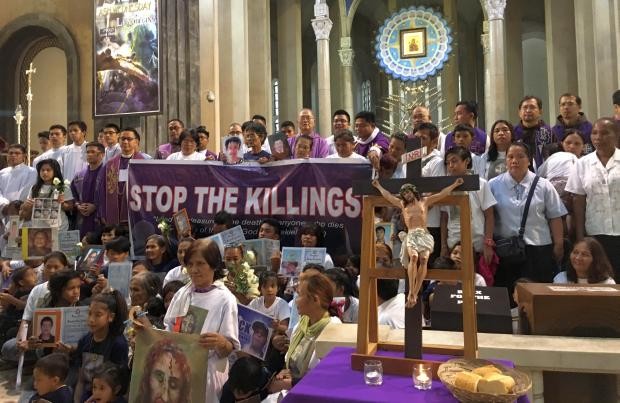
Relatives of drug war victims gather for the second Holy Eucharistic Mass Action on Thursday, March 2, 2017. (Photo by YUJI VINCENT GONZALES/INQUIRER.NET)
DAVAO CITY – President Rodrigo Duterte on Friday said he will one day give his narcolist to priests and bishops and will ask them to talk to drug personalities included in it.
He said priests would probably be able to help because they are their parishioners.
“These priests, they easily condemn (the government’s anti-drug war),” the President said during a Malacañang-sponsored dinner for media members here.
It was the third “get-together” that the President had sponsored for the media, one for journalists here and two for the Malacañang Press Corp.
“You go to these people (drug suspects) and tell them to stop already. You have the money to do that. That’s your job (also),” Duterte said, addressing the Catholic clergy – which has been high-critical of his anti-drugs war and the deaths of 13,000 individuals linked to illegal drugs.
READ: Church calls for end to drug killings
“They are alive, you talk to them and tell them they would end up in a very serious situation if they continued,” he added.
Duterte said the Catholic church could do this “preemptive move” if priests and bishops wanted to help.
“Also talk to the barangay captains (who are into drugs),” he said.
Duterte then explained that village chairs were not in the forefront of his anti-drugs campaign because “40 percent of them are involved in drugs.”
“You see? That’s how serious the problem is,” he added.
“We are now a narco-state. You ask why I did not tap the barangay captains (village chiefs)? I cannot trust the idiots anymore. Forty percent of the barangay captains are into illegal drugs,” Duterte said.
He said because of this, he had to use the military in the anti-drugs campaign and his orders were clear: to dismantle a drug factory and go after every drug suspect.
But Duterte said his order did not include killing drug suspects unless they put up a violent fight.
“I don’t need to tell the military and the police to do that. They know what to do,” he said.
That was why, Duterte said, the killing of drug suspects, particularly children, was not his policy.
“You can ask the military or the police in Manila if I ordered them to (kill drug suspects). If anyone of them stand up and say I ordered them to kill the poor and the children, I would resign because that would make me a liar, that’s the truth,” he added.
He said the Catholic church would always find fault in his campaign because they have irreconcilable positions on how to deal with drug criminals.
READ: Duterte hits Church silence on killing rampage of drug addicts
“Unless they understand my duty, it’s better for us not to talk of reconciling those two positions because those were irreconcilable. For them it’s pity and not hatred. No response. But the law is not like that. It takes pity on you but at the same time punishes by jailing you,” Duterte added.
He said the anti-drug campaign was not also specific for the poor.
“I am here to enforce the law. There is nothing there that says except the criminal has no income or is very poor, he is exempted (from liability),” Duterte said.
He said as an organized crime, all those involved in the drug business were equally liable and everyone was a co-conspirator.
“And the act of one is the act of all. Loosely-bound but still organized. There are those who cook the drugs, there are lieutenants to see to it the distribution is done, and (there are) the peddlers,” he said, adding that “(t)he liability of the high is the liability of the low there.”
The President also pointed out drug syndicates were using the law on juvenile delinquents to their advantage by tapping minors as runners, calling Republic Act 9344 of opposition Senator Francis “Kiko” Pangilinan a “short-sighted law.”
“The runner, did it not surprise you? I’ m not talking of a particular case, did it not occur to your mind that there are a lot of children (on the lowest level of the drugs trade)?” he asked.
He said the problem with the Pangilinan Law was that it acknowledged the social problem on juvenile delinquents but did not specify the measure in solving it.
Duterte also spoke of his desire to amend the Pangilinan Law.
“A child who commits a crime whatever, they go scot-free, no criminal liability at all. Not even a recording on the police blotter. What is recorded in the blotter (is) unidentified (suspect). So why would a policeman bother to make arrests? The law then was that below 9, there was no liability, (the suspect) is a baby. Above 9 but below 12, you determine if malice is there,” he said.
Duterte said the Pangilinan Law had resulted in “generations and generations of Filipinos who are criminals and do not have a sense of accountability.”
He reiterated that his anti-drug war would continue.
“It does not delineate between the poor and the rich, I am not about to do it. I do not play God,” he added.